#ask greater boston
Note
I do think greater Boston is about finding Leon ridiculous in the first episodes and then slowly but surely falling in love with him
What can I say? He's my baby girl your honor
I mean, he *is* ridiculous. Much of Season 1 has people wrestling with how they feel about him even after he's dead. But he's also a good person. And in death, he becomes a better person.
Yes, he's mean to be irritating in the beginning because he *is* irritating. But also, his positive qualities are overwhelming. The same can be said about Boston. The show is about people and a location striving to be better but also celebrating the goodness that exists in all of us. In an overwhelmingly evil world, it's important to celebrate what's good and strive to be better.
A while ago someone theorized we named the show Greater Boston to make it sound like a boring morning news show that gets weirder as it goes along - almost like a ruse.
The title is referencing that our Boston is a bit *greater* than the normal boston. It's also a reference to the fact that the characters, the creators, everyone within the show is striving for more.
19 notes
·
View notes
Text
i think people who want a diverse group of women with a wide range of moral standings and a tendency to behave in human and often less than perfect ways should listen to the hit audio drama greater boston.
#greater boston#I’m FINALLY listening to season four I am so sorry for taking so long#but like. there are so many women here. some of them are gay. at least one is ace.#one of them is possibly a terrorist depending on who you ask#two are huge Star Trek nerds who go to conventions about it#I can’t easily quantify gemma or louisa or Charlotte in a pithy tag they’re beyond me#nica is in prison (wrongfully) (sort of) becoming best friends with Ben affleck and Matt Damon (fictional)#(but based on the real people. sort of.)#Emily is the WORST KIND OF WOMAN and i DO say that with much loathing in my heart but also you WILL feel sympathy for her#AND MALLORY IS PERFECT !!!!
97 notes
·
View notes
Note
Nica Stamatis?
(Ask meme here)
First impression
Greater Boston is so cruel (complimentary) for making our first look at Nica basically the only time she's happy and confident. She's going to be famous! I don't think I knew quite what to make of the podcast or its characters then but man was I not prepared for the journey she would go on.
Impression now
:( <3 She goes through so much! She is complex and messy and interesting! She drives people away and lashes out and wants to be noticed but doesn't know how to ask. I am so sad about her. Actually I think she's doing a little better by the end of season 4 but I didn't retain that season very well, I need to relisten sometime.
Favorite moment
Nica gets so many great monologues, but I remain haunted by the story she tells at Leon's funeral and how she concludes "In that moment, I was famous." It ties back to her intro monologue in a brutal, unexpected way and sets up how the rest of her story so far will be her dealing with being infamous due to her poor choices. The funeral episode is where I first realized how good Greater Boston was going to be.
Idea for a story
I would have loved to see how Nica would've handled it if she's gotten 'possessed' by Leon the way Michael did. I think that might make her worse actually.
Unpopular opinion
Not enough people talk about Greater Boston for me to know what standard opinions are, but in-universe I think it's interesting that people talk a lot about the things Nica did wrong assisting the Lottery but don't dwell as much on Leon helping. Iirc Leon was the one who helped frame Isaiah which - as Isaiah notes - could have gotten him (a Black teen) killed.
Favorite relationship
Nica's connection with Emily is so interesting. She's spying on her but then genuinely becomes her friend, and Emily is awful but Nica gets why she's awful and sympathizes with her even while she's stabbing her in the back. Emily is still on her way to rock bottom, but I think if anyone is willing to extend a hand when she hits it, it'll be Nica. Emily will probably spit on it when she does, but you never know.
Favorite headcanon
Nica is probably still banned from several Italian restaurants on the North End. Some crimes can never be forgiven.
15 notes
·
View notes
Note
You listened to Greater Boston, right? Is there a metaplot? Like, is it a conspiracy theory red string board podcast or a listen on long car trips looking out the window podcast?
I’m trying to listen to more things post w359 and heard Greater Boston was good, so… yeah
Hello Anon! Yes I do listen to (and love) Greater Boston! I'm going to try to to focus on the particular questions you asked here, but for more of general attempts to pitch the show, you can look at these posts of mine: Greater Boston description ask , Greater Boston pitch post. (These posts are from a while ago, so stuff has happened in the show since, but I still think they provide a decent introduction, to the extent that it is possible to sum up this show.)
Greater Boston very much has an ongoing plot, or rather a range of interweaving ongoing plot threads. I hesitate to call it a 'metaplot' because I almost think that implies an apparent anthology structure (like in The Amelia Project or The Magnus Archives, both of which I'd describe as anthology shows from which a metaplot emerges. Greater Boston isn't really that). The first couple of episodes might seem slightly like they are each a few somewhat self-contained stories, but that approach changes quickly. The show follows a wide range of characters and events, but I'd say that the connections, throughlines, and returns to key characters are frequent enough to create the sense that you are following one big story.
I'm not sure I completely understand what you mean by your dichotomy of red string vs long car ride podcasts. Greater Boston definitely lends itself to a fair amount of red string thinking, given that there's an extremely high number of characters who interconnect in a range of ways, and some really interesting stuff going on with the nature of the storytelling later on.
But, at least in my eyes, Greater Boston is not primarily focused on figuring out a mystery/conspiracy, or theorising about what will happen, in the way that the 'red string' approach might imply. There are some mysteries, but for all of the utterly wild stuff that happens in this show, what appeals to me the most about Greater Boston is the characters, and how the show forces you to engage with everyone from the main focus characters to the smallest minor character to the antagonists you thought they couldn't make you sympathise with. What ultimately keeps me thinking about this show is the emotional journeys of these characters, the ways they struggle and impact each other and relate to one another... (And to be honest, I don't really kid myself that I can actually predict where this show is going to take you next.)
Does Greater Boston fit the "listen on long car trips looking out the window" vibe? If the long car journey vibe means a show you can just let wash over you while you tune in and out of it, then probably not. But if you mean something that can hold your attention for a long period, with enough variation in tone and plot to keep you interested, then Greater Boston definitely slots into that category for me.
Obviously I'm going to say you should listen to it, because, well, you came to a fan of Greater Boston in order to ask about it, but I hope this response helped you figure out if it's the vibe you're looking for at the moment!
(From the past tense of 'listened' in your ask, I wonder if you might be under the impression that this podcast is fully released. So I just thought I'd mention that while the Season 4 finale had some sense of resolution, there is still a fifth and final season of the show planned!)
#Thanks for the ask anon!#I love being asked to talk about my favourite podcasts#Greater Boston#Greater Boston podcast#I'm putting this in the Greater Boston tag just so any other fans can share their thoughts for anon#I'm fascinated by this way of categorising audio dramas#Where do different shows fall on the red string to long car journey spectrum?#If I've misinterpreted what you meant anon#feel free to send another ask to help me understand#or just if you have more questions#Also if at any point you do listen to it#I'd love to hear what you think#the empty man posteth#the empty man answereth#Long post
20 notes
·
View notes
Text
Emily is the absolute worst but also holy. shit. the horror of your husband begging you to agree to reprogram you, as a robot, so that you can "be happy together again" i'm. holy shit.
#ngl the horror trope here is fascinating to me#the fact he more or less ASK her to make that choice#feels somehow even worst than just doing it to her for some reason???#do you love me enough to become my creature instead of your own self#you want us to be happy don't you#don't you#fuck#greater boston#this is going to turn into my head
30 notes
·
View notes
Note
Wait
Wait wait wait wait
Narrator?
The fucking NARRATOR?
Greater Boston breaks the fourth wall in one of BEST ways I think I've encountered in a podcast. I'm not sure where exactly you're up to/where various Narrator Shenanigans happen but it is SO good
#greater boston#ask#anon#some horror podcasts have done it well but NOTHING will live up to the narrator quitting because hes fed up with another character
93 notes
·
View notes
Photo
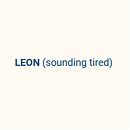

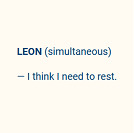

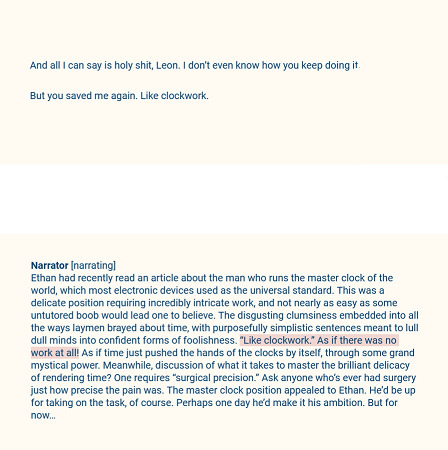
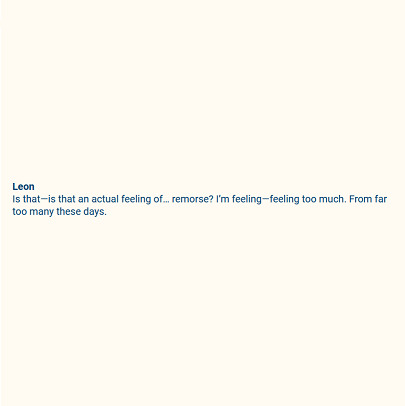
(image id: 6 screenshots of the greater boston transcript. the first screenshot reads: “LEON (sounding tired)”. the second screenshot reads: “LEON: i - uhh - i can’t think straight. it’s as if...i...i need to rest. i need to rest. i need... sleep.”
the third screenshot reads: “LEON (simultaneous) - i think i need to rest. the fourth screenshot reads: “LEON: i - this is getting more challenging to - to - ...keep straight. ugh.”
the fifth screenshot is two excerpts from the transcript stacked on eachother. the one on the top reads “and all i can say is holy shit, leon. i don’t even know how you keep doing it. but you saved me again. like clockwork.
the one on the bottom reads: “ethan had recently read an article about the man who runs the master clock of the world, which most electronic devices used as the universal standard. this was a delicate position requiring incredibly intricate work, and not nearly as easy as some untutored boob would lead one to believe. the disgusting clumsiness embedded into all the ways laymen brayed about time, with purposefully simplistic sentences meant to lull dull minds into confident forms of foolishness. “like clockwork.” if there was no work at all! as if time just pushed the hands of the clocks by itself, through some grand mystical power. meanwhile, discussion of what it takes to master the brilliant delicacy of rendering time? one requires “surgical precision.” ask anyone who’s ever had surgery just how precise the pain was. the master clock position appealed to ethan. he’d be up for taking on the task, of course. perhaps one day he’d make it his ambition. but for now…“ there’s a highlighted segment. “”like clockwork as if there was no work at all!���
the sixth screenshot reads: “LEON: is that-is that an actual feeling of... remorse? i'm feeling-feeling too much. from far too many these days.“ end image id.)
.
...i can’t help but get the feeling that leon is probably going to be reaching his limit soon...
#i yell into the abyss#greater boston#greater boston spoilers#this is certainly a guy who is very tired if i've ever seen one!#i know he agreed to help gemma with red line but uh.............................. frankly i wouldn't at all blame him for peacing out#(i'm actually kind of hoping he does!)#also i'm sure hoping gemma wouldn't blame him for peacing out either because By God! That Looks Bad!#leon stamatis#also sorry for the weird image formatting but it was Important to me that they were Square and this is the only way i could think to do it#there's a whole thing like ''gemma'll help leon escape the crystal ball if he helps her with red line''#and i'm like yeahh.... but i uh...... don't really think he should HAVE to help her with red line in order for her to let him out#even ignoring the fact that it's her fault he's stuck in there anyway....... keeping him trapped in there just cuz he won't help her#................would be pretty messed up :(#there's also the little added part of the deal where she'll help him reunite with his siblings if he helps her and that's. better? i guess?#but again... getting him to his siblings is something that she could VERY EASILY do..... AND he's been stuck in there for YEARS.............#leon's helping her right now mostly because she asked normally and he wants to. but i feel like he shouldn't HAVE TO to like. EARN FREEDOM.#you know????????????#anyway: arugula's trailer got me wondering if we're going to be learning more about leon's character......#i guess we'll find out! <3#the images have comments attached to them that transcribe them
4 notes
·
View notes
Note
Hey, I love your art -- I was wondering if you ever posted your illustration for Kafka's "A Hunger Artist" on here? It's really evocative and gorgeously framed, and I find myself thinking of it frequently!!
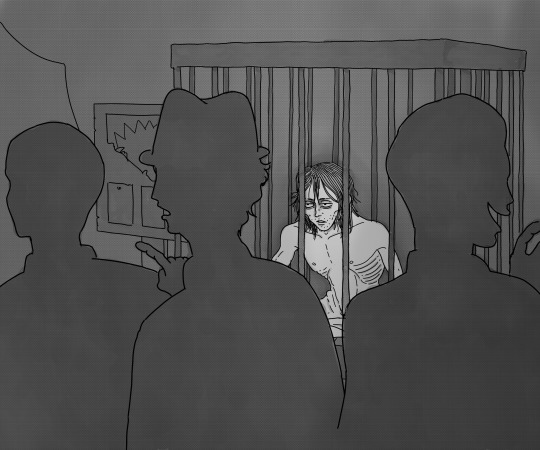
Thank you for the kind words. A Hunger Artist by Franz Kafka is one of my favorite short stories of all time, and it’s a very quick read. You can read it right here:
https://www.kafka-online.info/a-hunger-artist.html
Go ahead, I’ll wait here.
I’d like to take us opportunity to talk a little bit about the story, if I may.
Although there are a couple different interpretations of the story's meaning, it unambiguously read to me as an allegory for the plight of the creative, likely drawing from Kafka’s own experience. The ‘starving artist’ comparison is obvious, but there’s much more to it than that. In a departure from most other depictions in media, the plight of the artist is not depicted as something noble or redemptive, but as a sort of self-destructive madness. The hunger artist dies alone and in obscurity, his impact on the world ultimately being completely marginal and insubstantial. When questioned about why he chose a life like this, he reveals that he doesn’t even enjoy fasting, he simply couldn’t find any food he liked. That is to say, a true creative does not select this kind of self destructive lifestyle because they enjoy it; rather, it is because they cannot possibly bear to do anything else. Kafka himself, It should be mentioned, supposedly despised pretty much every job he ever had.
As some of you may know, I developed severe tendinitis a couple months ago. Mentally, September was probably the worst months of my entire life. I reflected on this story a lot –I had wrought my own self destruction, and for what? A couple of bucks? A few comics that i’ll become embarrassed of in a year’s time anyway? Unsure about my prospects for recovery, I became incredibly depressed.
But having been starved of the ability to write or draw, I had a genuine epiphany. Standing at the corner of Boston liquors in Allston, I resolved that I would muster the strength to endure this, regardless of how long it took, because what awaited me at the end was nothing short of the greatest prize a person could ask for: That very thing derided by Kafka –the life of an artist.
There is no greater pleasure than making art. I mean that genuinely, I mean that literally. No, it isn’t noble, no, it isn’t redemptive, but in a totally hedonistic and self-serving way it is simply the greatest thing that life can offer, ambrosia in the mouth, better than sex, better than drugs, better than anything that money can buy, and I feel pity for anyone unable to experience it. I am not being hyperbolic, I am not being metaphorical. I am stating this in the plainest of terms, having lived a life without it for the last couple of months.
So although my personal relationship to the story has changed in the past couple months, Kafka was right about one thing; nothing else tastes good, at least not by comparison. We must imagine the hunger artist happy.
1K notes
·
View notes
Text
Just crashed google maps by asking it to show me all of the Dunkin’ Donuts locations in the greater Boston area.
708 notes
·
View notes
Text
Hello! I'm casting for a unique audio fiction related project. It should not be a huge time commitment, or (unfortunately) a lot of money. But hopefully it'll be fun, and all parts will be compensated.
This quite possibly will be weirder than Greater Boston, but have a similar heart.
If you have any questions, feel free to ask me here or at the GB account. Thanks!
#casting call#open casting#paid casting#audio fiction#audio drama#podcast#audio fiction podcast#audio fiction casting call
297 notes
·
View notes
Text
Only Friends: Sand's crushing reality 'It's never about me'
I've noticed a lot of comments wishing Sand could be open about his feelings for Ray. Though that's a fair assessment and would save us a tonne of agony, I've attempted to delve into why this isn't so simple.
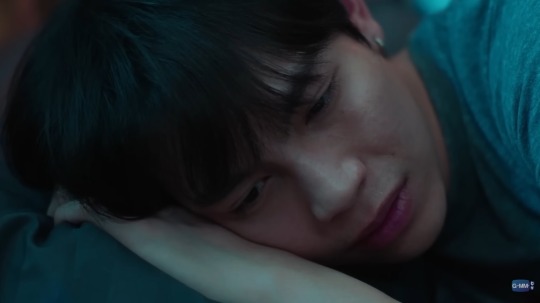
The Weight of Dignity & Mutual Respect
Sand comes across as someone who highly values dignity. Everyone deserves to be treated with due respect, and this is seen through how he interacts with others. Sand gets upset when someone questions his integrity, such as when Ray insinuates him to be a thief or questions him for bootlegging alcohol. He gets angry when someone tries to hurt Ray whilst his back is turned. Sand lives his life by an honourable and respectful philosophy, and the least he expects is for others to treat him the same way.
Therefore it's understandable that he hates being treated like a fool (whether that's being taken advantage of, humiliated or subjected to unwarranted judgement).

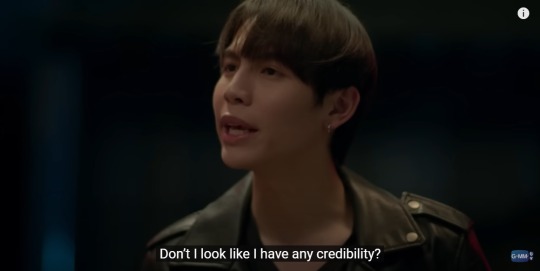
Ray has consistently maintained that he doesn't see Sand as a boyfriend. Said so himself, repeatedly. (Despite his actions indicating otherwise but that's another post in itself). So if Sand were to reveal his feelings, when he has no definitive confirmation that Ray is taking any of this seriously, he's going to risk feeling incredibly exposed and ridiculous. One of the reasons why rejection is so painful is due to the shame that comes with it. A hit of crippling inadequacy and embarrassment. Being confronted with: 'You're not good enough for me. You don't meet my standards. You're not what I want'.
Sand has probably had to experience a fair amount of falling short. To be lesser than, but largely due to means outside his control. He's been able to rise above those things. However, with Ray, he's not comfortable being in a position where he may be stripped of his dignity.
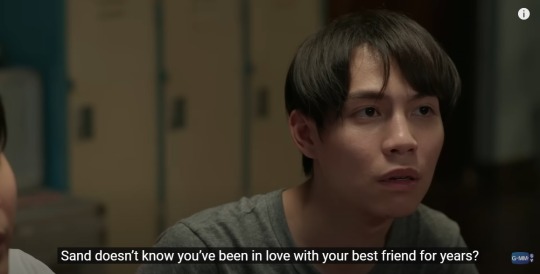
Boston being the one who dropped the bombshell is what made Sand feel incredibly stupid. For not knowing. For not being told. Which was arguably 100% times worse than hearing it from Ray himself. To be treated with respect is hoping someone will see you as an equal. Regardless of whether they are more than friends - even just between friends, Ray has never alluded to this. (To be fair, he may have been close, but now we'll never know). In that moment, it dawns on Sand how little he knows of Ray.
My belief is that if he were aware of Ray still being in love with Mew, he wouldn't make a move. Because that wouldn't be the honourable or respectful thing to do. So he’s been led to indulge in a fantasy that was never going to materialise. He wasn't in the loop. No one clued him in. He's not been treated equal. He feels like the butt of a bad joke. How could he possibly open up to Ray after that?
The 'Brave Face' of a Caretaker
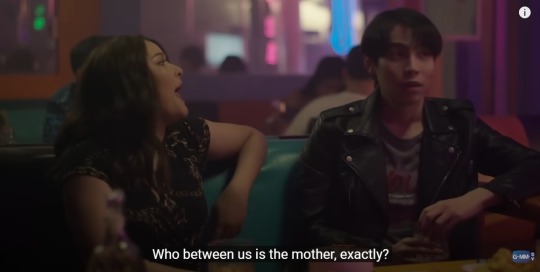
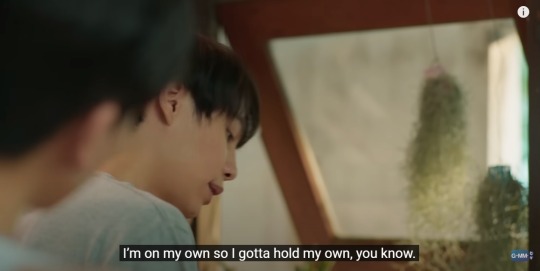
Sand is a man defined by responsibility. Due to having only one parent in his life, he's learnt to be his mother's rock; resilient and steadfast. The sacrifice of having a caretaker mentality is that your own wellbeing is often an afterthought. How frequently do these types of people in our lives get asked how they feel. How are they doing? They're so busy taking care of everyone else or taking care of 'business', that no one ever thinks to ask. Their cries for help are much quieter, much less obvious and go undetected.
Though Sand is not the best at hiding it, he'll quickly distract others from his own disappointment, upset and hurt for the sake of greater harmony or in consideration of someone else's feelings. 'It's not about me', he seems to remind himself. 'I've got to keep it together. I've got be strong. There's a lot resting on me'.
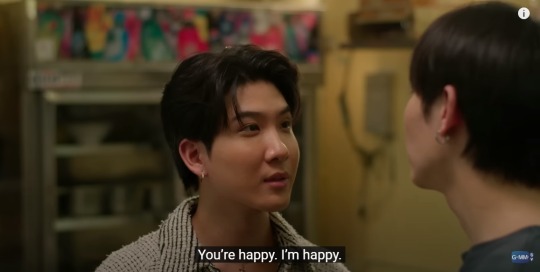
Caretakers need others to take notice of them. To see past their seemingly infallible façade. They need others to initiate care and concern because they won’t put themselves first. Though Sand's mother evidently adores him, he’s clearly established a dynamic where he takes care of her. So who takes care of Sand? No one. He's on his own. He has no choice but to suck it up when things get tough and move forward as best he can. Life isn't going to stop for him.
Though hugely rattled, Sand immediately diffuses the fight. No questions, no demands that Ray explain himself. He’s still protective of Ray. No matter what happens, he comes second.
The Fault is Yours
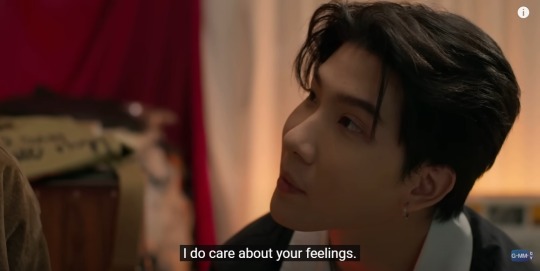
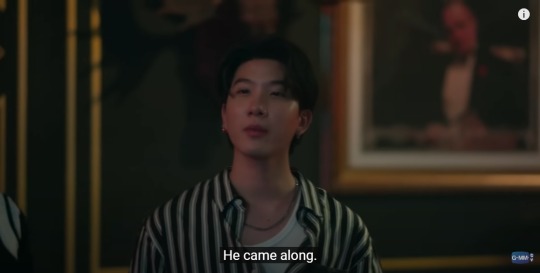
Sand really desires someone to see him as 'special', as extraordinary. His life often revolves around others, so if he’s someone else’s priority, that will be a sign. This is why Sand was so affected by Ray passing him up for someone else - he felt expendable.
The gut-wrenching thing about Sand is he doesn't target blame onto others. He doesn't resent his father (who has no idea of his existence). He doesn't resent his mother (who wasn't able to give him a good start in life). He doesn't even resent Ray when he finds out about Mew (because Ray knew Mew first). Instead Sand internalises hardship as a reflection on himself. The reason why Ray can't see him as a boyfriend must be a product of his own shortcomings. Perhaps he's unworthy of someone like Ray to begin with. Boston makes a passing comment that men with Ray's looks and wealth are hard to come by. Sand doesn't need to be reminded that Ray has options. Access to more options besides him.
Things were never handed to Sand on a silver platter, and so he isn't one to assume anything. Don't assume Ray's feelings even if you have a hunch. Don't assume that Ray will fight for you. Don't assume that when push comes to shove, Ray will choose you. Because who are you to assume those things?
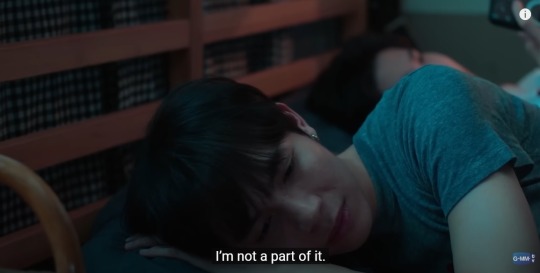
It's one thing to be told you can't have something. But it's another to feel like you don't deserve something. As if you never had the right. Never had a chance.
The fault is yours for thinking you did.
Because you're simply not that special.
(Note: So I'm going to need to see a situation where Ray takes care of Sand please. The boy needs it. He needs someone to fight for him for a change. Bear in mind this is just an analysis of what Sand may be feeling. A lot of these assumptions are untrue as Ray does care. But Sand doesn't know what to think anymore.)
#only friends#only friends the series#ofts#only friends meta#ray x sand#sand x ray#sand#firstkhao#khaofirst#first kanaphan#khaotung thanawat#protect him please#god sand absolutely broke my heart this episode#he needs a hug#sand really doesn't have anyone to lean on#he carries so much on his own shoulders
436 notes
·
View notes
Note
Going in the alternative way of blorbo thinking: I couldn't fix Leon, but hell yes, that man could fix me
Fix implies we're broken. We're not broken. We're works of art. We're meant to be this way.
There are no perfect dance steps, there is only movement.
12 notes
·
View notes
Text
So, we’ve gotten to the entry where Mina has a “I’m not like the New Women” moment, let’s talk about what the concept of the New Women and why it is deeply ironic for Mina of all characters to be dismissive of them.
With the second wave of industrialization and the increase in the ability of women to access higher education in England starting in the 1870s, there was a corresponding social movement to change the way women were perceived.
New Women were educated women who had careers - usually from the increasingly large Victorian middle and upper middle class. They advocated for women to have greater autonomy over their lives and greater financial freedom. Basically the ability to live on their own and not have to rely on men and marriage. It was also wrapped up with the suffragette movement - though the New Woman was not necessarily a suffragette.
There was a lot of backlash in late Victorian society which claimed that independence was unwomanly and would lead to the emasculation of men and the neglect of the family. As tame as it may seem to us now, this sort of thing was supposed to look absurd because the men and women have switched gender roles:
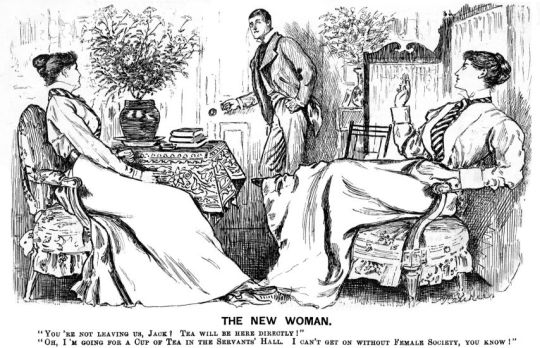
So when there are jabs at New Women in sections of Dracula about how women will propose in the future, we are supposed to read it in the same sense as the Punch parodies. This is supposed to be an absurd notion that would upend gender norms. Of course as modern readers it doesn’t because we’ve moved past those gender roles.
But it is also striking in the text because Mina is the picture of the New Woman without the satirical varnish of something like Punch. She is from the middle to upper middle class. She is well educated and has a job at the beginning of the novel: She is a school teacher.
Socially she is exactly the kind of woman who has the position to be more independent. The idea that she is a New Woman also comes from her characterization. She is a very active character and has a remarkable amount of agency. She goes places and asks questions and starts to put together the mystery without necessarily relying on men.
And her relationship with Jonathan actually does invert gender roles. She is the person who is more active and Jonathan is more reliant on her. He may be the breadwinner (or will be now that he’s fully a solicitor and not just a clerk), but they don’t have a very typically gendered relationship for the period.
And on the note of the gay subtext in Mina’s relationship with Lucy - New Women were also the kind of people who entered into Boston Marriages.
And it seems that Stoker tries and fails to distance the character he wrote from the image of the New Woman. There are these weirdly out of character comments in Mina’s journal about New Women that read as either deeply ironic or as Stoker backpedaling on the character Mina actually is.
There are also sections later that point to Stoker having a very ambivalent relationship with feminism, but it will be worthwhile to discuss those when we get there.
But the crux of why Stoker seems to think he hasn’t written a New Woman is this: Mina is exceptionally nurturing. She cares for Lucy. She cares for other characters when they are physically or emotionally compromised later. Mina’s most stereotypically feminine feature is that she is a carer. She is not the image of a woman who emulates the emotional expression of a man.
Read from a modern perspective it comes across as a bit absurd, because being an independent woman and being nurturing are not mutually exclusive.
4K notes
·
View notes
Text

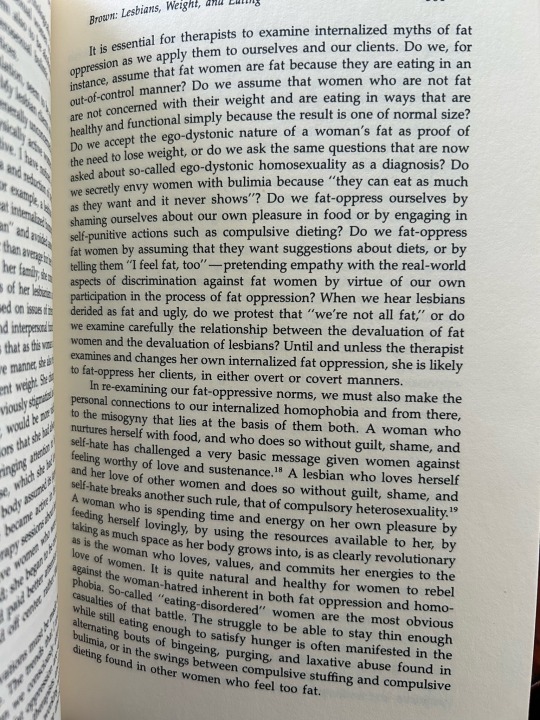
laura s. brown, from lesbians, weight, and eating: new analyses and perspectives, from lesbian psychologies: explorations and challenges, edited by the boston lesbian psychologies collective, 1987
["Lesbian fat activists, a non-client population, seemed to be women who are comfortable with their lesbianism. My lesbian clients who are fat, although not necessarily activists, seem to be generally unconcerned about their weight and are for the most part physically active women who perceive themselves as healthy and attractive. I have noticed a relationship between healing from homophobia and reduction of negative self-concept where weight is concerned. For example, a lesbian client who entered therapy from a position of great internalized homophobia could not comfortably say the word 'lesbian' and avoided associating with other lesbians. Her weight was greater than average for her height, although within the norms for women in her family: she consciously perceived her fat as one of the indicators of her lesbianism and her undesirability as a person. Therapy focused on issues of internalized homophobia as it affected self-concept and interpersonal functioning. However, a side effect of the therapy was that this woman came to embrace her lesbianism in a more positive manner, she also began to see herself as attractive at her current weight. She changed her hairdo so that her face, which she had previously stigmatized as looking fat, and had tried to hide with her hair, would be more visible. She also purchased clothing in bright colors that she had always liked but had avoided buying for fear of bringing attention to her "fat, unattractive" body. She took up exercise, which she had loved as a girl but abandoned after puberty as her body assumed its (apparently) genetically determined larger size. She became active in the lesbian community and often commented in therapy sessions about her amazement that there were so many attractive women who were also fat. Her relationship with food also changed: she began to be more careful about what she put into her body, and paid better attention to foods that left her feeling uncomfortable and off center, rather than simply to caloric content.
Such anecdotal and clinical observations must be made cautiously because the empirical data is sparse. The trends that I and my colleagues have observed clinically when we consciously attend to the relationship between homophobia and fat oppression are suggestive. They point to some directions that lesbians and therapists, and therapists who work with lesbians, may wish to consider in working with lesbian clients around issues of food, eating, and body image and size.
It is essential for therapists to examine internalized myths of fat oppression as we apply them to ourselves and our clients. Do we, for instance, assume that fat women are fat because they are eating in an out-of-control manner? Do we assume that women who are not fat are not concerned with their weight and are eating in ways that are healthy and functional simply because the result is one of normal size? Do we accept the ego-dystonic nature of a woman's fat as proof of the need to lose weight, or do we ask the same questions that are not asked about so-called ego-dystonic homosexuality as a diagnosis? Do we secretly envy women with bulimia because "they can eat as much as they want and it never shows"? Do we fat-oppress ourselves by shaming ourselves about our own pleasure in food or by engaging in self-punitive actions such as compulsive dieting? Do we fat-oppress fat women by assuming that they want suggestions about diets, or by telling them "I feel fat, too"— pretending empathy with the real-world aspects of discrimination against fat women by virtue of our own participation in the process of fat oppression? When we hear lesbians derided as fat and ugly, do we protest that "we're not all fat," or do we examine carefully the relationship between the devaluation of fat women and the devaluation of lesbians? Until and unless the therapist examines and changes her own internalized fat oppression, she is likely to fat-oppress her clients, in either overt or covert manners.
In re-examining our fat oppressive norms, we must also make the personal connections to our internalized homophobia and from there, to the misogyny that lies at the basis of them both. A woman who nurtures herself with food, and who does so without guilt, shame, and self-hate has challenged a very basic message given women against feeling worthy of love and sustenance. A lesbian who loves herself and her love of other women and does so without guilt, shame, and self-hate breaks another such rule, that of compulsory heterosexuality. A woman who is spending time and energy on her own pleasure by feeding herself lovingly, by using the resources available to her, by taking as much space as her body grows into, is as clearly revolutionary as is the woman who loves, values, and commits her energies to the love of women. It is quite natural and healthy for women to rebel against the woman-hating inherent in both fat-oppression and homophobia. So-called "eating-disordered" women are the most obvious causalities of that battle. The struggle to be able to stay thin enough while still eating enough to satisfy hunger is often manifested in the alternative bouts of bingeing, purging, and laxative abuse found in bulimia, or in the swings between compulsive stuffing and compulsive dieting found in other women who feel too fat."]
#laura s. brown#the boston lesbian psychologies collective#lesbian literature#cw disordered eating#cw weight mention#transcribed
91 notes
·
View notes
Text
I could think about Bernie the mailman as an everyman, as Just Some Guy, who whistles while he works, who wants to do his job well and go home to his husband and dog. I could think about Bernie the mailman as a mail carrier who is proud of his 100% delivery rate and wants to get the state record even though he works in a bonkers train city. I could think about Bernie the mailman as the descendent of a long line of mail carriers with mysterious mail-delivery superpowers which allow him to deliver letters without a proper address. I could think about Bernie the mailman as an audience stand-in, waiting expectantly for people to open their letters from Michael, keen to hear them read the letters out (and perhaps disappointed if they aren't ready yet). I could think about Bernie the mailman as a tool of the narrative, enabling a kind of delayed but significant communication. I could think about Bernie the mailman as a representation of the way that harsh truths, important lessons and emotionally complicated revelations can seek people out in unexpected places. But at any rate I am finding myself thinking about Bernie the mailman a lot more than I expected.
#Greater Boston#Greater Boston podcast#Help I'm getting attached to a minor character#This is such a niche post and I don't care#I love that he bribes jail guards with baked goods so he can make hand deliveries directly to prisoners#In any other show Bernie would not really be a character at all#The farewell letters could stand on their own#But the way that the delivery of the letters is starting to almost feel like a plotline in its own right#definitely adds something#Btw I'm not actually disappointed about the letters that we haven't heard yet#I know they'll be revealed at the right moment#but when Bernie asked Nica and Louisa if they were gonna open it#(and why not)#I was like 'oh he's invested in the story just like me'#Greater Boston spoilers
21 notes
·
View notes
Note
No but why was I also thinking of Louisa following the mailman??!? Greater Boston really is That Bitch. Iconic. Unparalleled Storytelling.
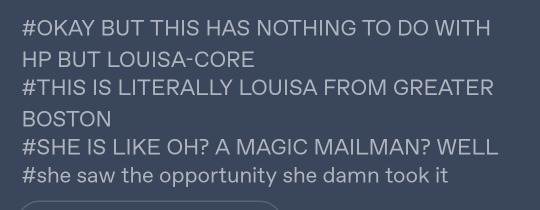
Literally one of her best (if not the best????) Louisa moment EVER. it was so SMART. And she revealed herself in style, too.
A Moment of Appreciation for Louisa Alvarez, Amazing Detective;
ALSO A MOMENT OF APPRECIATION FOR GREATER BOSTON. who spent a season offering us this side-character with a GENUINE SUPERPOWER as if it was Classic Postal Service, and then used him as a critical plot point just when needed, when frankly he could have just stayed a narrative device
but that's greater boston huh. Oh? A Narrative Device? You Fool.
#Having a burst of fresh love for the women of Greater Boston#and greater boston in general#thank you for this ask it reminded me in o.3s that this show is perfect
3 notes
·
View notes